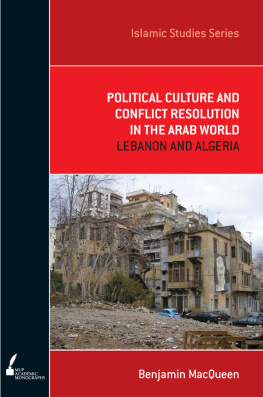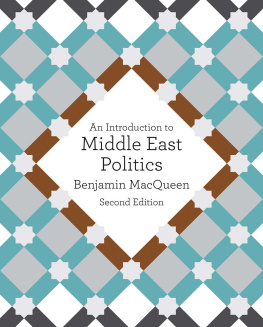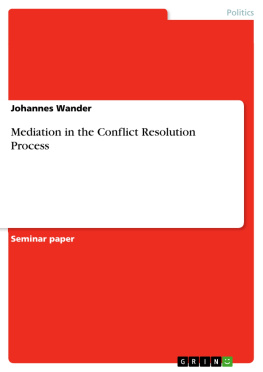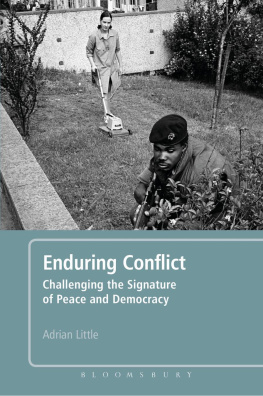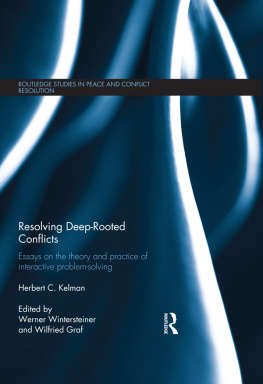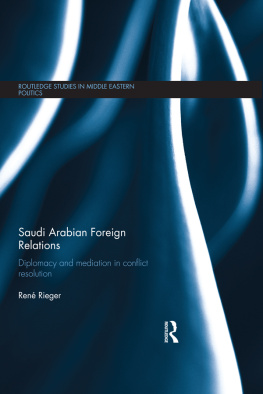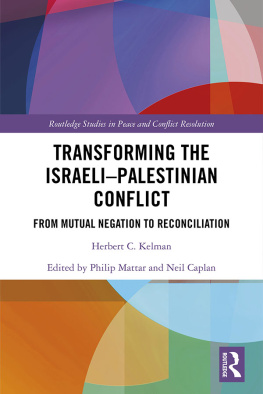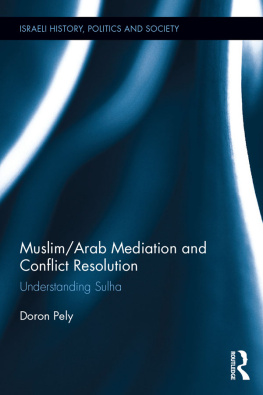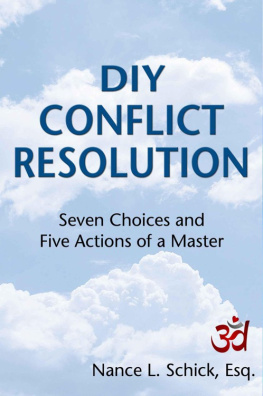Political Culture and Conflict Resolution in the Arab World
MUP ISLAMIC STUDIES SERIES
The Islamic Studies Series (ISS) is aimed at producing internationally competitive research manuscripts. This series will showcase the breadth of scholarship on Islam and Muslim affairs, making it available to a wide readership. Books in the ISS are based on original research and represent a number of disciplines including anthropology, cultural studies, sociology and political science. Books in the ISS are refereed publications that are committed to research excellence. Submissions on contemporary issues are strongly encouraged. Proposals should be sent to the ISS Editor.
Associate Professor Shahram Akbarzadeh
ISS Editor (shahrama@unimelb.edu.au)
Board of Advisors
Associate Professor Syed Farid Alatas
Department of Sociology, National University of Singapore
Professor Howard V. Brasted
School of Humanities, University of New England
Professor Robert E. Elson
School of History, Philosophy, Religion and Classics, University of Queensland
Professor John Esposito
Director, Prince Alwaleed bin Talal Center for Muslim-Christian Understanding, University Professor of Religion and International Affairs,Georgetown University
Emeritus Professor Riaz Hassan AM, FASSA
ARC Australian Professorial Fellow, Department of Sociology, Flinders University
Professor Robert Hefner
Institute on Culture, Religion and World Affairs, Boston University
Professor Michael Humphrey
Chair, Department of Sociology and Social Policy, School of Philosophical and Historical Inquiry, University of Sydney
Professor William Maley AM
Director, Asia-Pacific College of Diplomacy, Australian National University
Professor James Piscatori
Centre for Arab and Islamic Studies (The Middle East and Central Asia), Australian National University
Professor Abdullah Saeed
Sultan of Oman Professor of Arab and Islamic Studies, Director, National Centre of Excellence for Islamic Studies, University of Melbourne
Professor Amin Saikal AM
Director, Centre for Arab and Islamic Studies (The Middle East and Central Asia), Australian National University
Associate Professor Samina Yasmeen
Director, Centre for Muslim States and Societies, School of Social and Cultural Studies, University of Western Australia
Introduction
This view draws on what are labelled here as structuralist perspectives on the causes and resolution of conflict, in particular a focus on the presence of a mutually hurting stalemate whereby parties involved in a conflict are driven to view a negotiated settlement as more advantageous than continued violence. This stalemate, in turn, provides a ripe moment in which the belligerent parties can be brought together for potentially fruitful negotiations. Thus, it is the structures of conflict that determine if and when parties enter into a conflict resolution process and how much they are willing to negotiate in this process.
The economic reform measures employed by the single party regime of the National Liberation Front in the 1980s led to the exclusion of the formerly loyal body of state employees, many of whom lost their livelihoods during this period. This group threw their weight behind the Front Islamique du Salut (Islamic Salvation FrontFIS) in the elections of 1989, 1990 and 1991.
Thus, material interest rather than ideological affiliation or spiritual compulsion was a potent force in compelling many Algerians to support an overtly religious party. This argument complements similar themes in conflict and resolution studies where it is argued that the violation of individual interests, what Burton has defined as basic human needs, are the key factors in explaining why violence is pursued and conflict resolved. It is only through an effort to restore basic human needs that the underlying causes of conflict can be addressed and conflict resolved.
However, such explanatory tools, whilst revealing crucial factors affecting resolution processes during civil war in the Arab world, do not tell the whole story. For instance, several peace agreements failed in Lebanon that reflected mutually hurting stalemates for the belligerent groups in the conflict before the final agreement in 1989, the Taef Agreement. In addition, the final agreement did not offer any substantial reform to the confessionally based political structure of the country that would satiate the needs-based grievances of parties who were formally excluded or restricted prior to the outbreak of war in 1975. Similarly, the timing of the peace initiative of Algerian President Abdel Aziz Bouteflika, the Civil Concord, was not at a so-called ripe moment where a mutually hurting stalemate forced parties to the negotiating table. In addition, the need for distributive justice for those affected by the conflict in Algeria was not contained within this initiative.
That is, conflict emerges over how the political community, over which the state has authority, is defined. Structural influences compelling contestations for power and material interest in ensuring that ones community has a stake in political authority are important explanatory factors. However, those values and assumptions that underpin or characterise a political community, the political culture, require exploration in terms of what compels a community to both engage in conflict and seek the resolution of conflict at a particular time.
It is from here that the research focus increasingly shifted to explore other sources of influence on the processes of conflict resolution, and the influence of political culture emerged as a factor that also played an affective role in giving shape to the resolution processes in Lebanon and Algeria. In pursuing this, there is a set of conceptual tools for understanding the role of political culture in conflict resolution. For instance, formative studies in the area of political culture and conflict resolution proposed the development of resolution ethnopraxes based on single case studies as the foundation for broader comparative studies. However, there has been minimal development in terms of case-based, comparative studies that focus on the impacts and influence of political culture on the conflict resolution process.
Those studies that have sought to engage with this issue have tended to focus on the particularities of each case. Whilst providing thorough details of particular conflicts and resolution processes, these approaches lacked comparative quality, an attribute that is essential for the development of broader theoretical tools. Inversely, attempts to develop theoretical perspectives on the role of political culture and conflict resolution have lacked sharpness, an ability to be formally applied to a specific cultural environment to gauge their explanatory capacity. This book addresses such a need whereby a specific understanding of political culture is developed in relation to the processes of conflict resolution in the Arab world. In particular, the book explores those areas left unexplained by the two dominant analytical modes of conflict resolution analysis, structuralism and materialism, through examining the affective and explanatory role of political culture.

